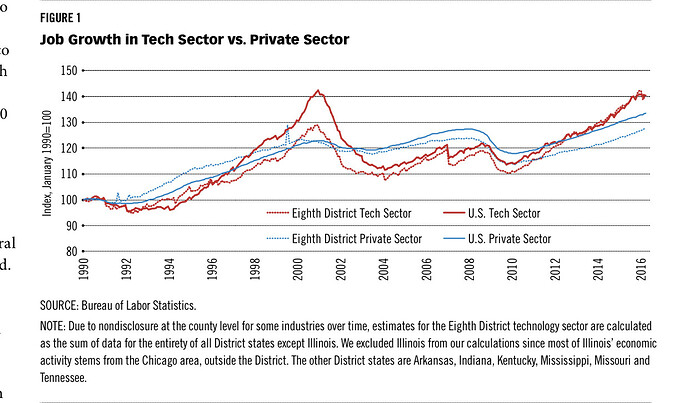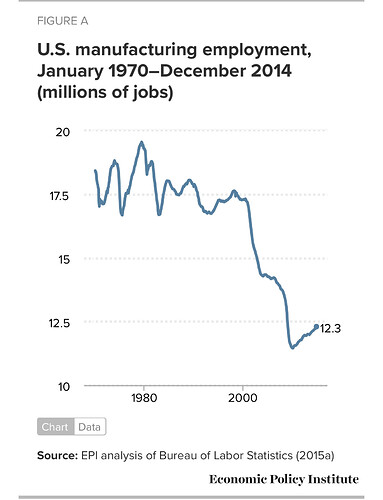Your evaluation of the merits of complex economic issues was “these bad people support it, so it must be bad”.
It’s just a lazy way to smear a position without going through with all the bother of actually arguing against it.
Whatever. I have been taking out frustrations here without offering anything constructive for a while now. You’re right that was hostile. It was unnecessary. I’m sorry. The same goes to other people who I’ve been unfair to recently. I’m gonna work on getting my shit together and get to a place where I contribute something more than venom here.

I find you to be one of the best posters on this site, so regardless of whatever changes you make to your posting style I hope you continue to bring the same perspectives, even if they’re occasionally harsh.
Yeah, or if you ever leave the site gimme your email. Or just continue to PM me like all the people who have “left” the site so we can have secret threads that the rest of you jamokes don’t even know about.
Converting a fallacy into mathematical form doesn’t make it suddenly not a fallacy. Bayesian analysis isn’t useful if you’re gonna pretend that one cherry-picked piece of information is the only data point in existence. That’s just garbage-in-garbage-out.
I can reach the opposite conclusion by the same method: Noam Chomsky’s opposition to NAFTA is strong Bayesian evidence of it being bad. Direct quote:
It’s great for rich people in Mexico, it’s great for rich people in the United States, and it’s bad for everybody else.
I hesitate to go further, for fear of further rebuke from you and everyone else, but there a thousands of other examples of Trump/Perot being wrong on economic issues. I only mentioned the one, because I assumed everyone was aware of their general backgrounds.
Trump and Perot have much higher miss rates than Chomsky (anyone) has hit rates. Your example is also weaker on that front.
The point is that you don’t figure out if something is good by evaluating its supporters and detractors. You evaluate the thing.
Of course. But when the thing is complex, abstruse, and susceptible of demagoguing, the use of as I put it a heuristic is useful. Obviously everyone here either fully understands the ramifications of NAFTA and all possible counterfactuals or at least is comfortable putting forward that facade and so my heuristic is worthy of derision. I understand that much.
My “single data point” remark wasn’t referring to the number of times Trump has been wrong, but rather the single piece of info (Trump’s opinion) plugged into your Bayes formula as though we’re in a vacuum save for that one fact. My Chomsky example was to show that if I place myself into a different vacuum with only Chomsky’s words, now I’m the one who gets to appeal to Bayes. But all this really does is make Bayes roll in his grave.
Apologies if I’m just stating the obvious, but the combination of your Bayes post and
I assert a position on the economy is very likely bad b/c Perot/Trump/Paul VEHEMENTLY endorse it
made me think it needed to be said.
I don’t claim to understand every bit of NAFTA, but what I do know is this:
There are lawyers, economists, and policy experts who are hired by Fortune 500 companies, the Chamber of Commerce, and think tanks to formulate business plans, create strategies, and guide decision making that advances the interests of their employers–the capitalist class. These are smart people. When they negotiate with labor, vendors, and customers, they know how to advance the interests of the people that hire them.
The people who sit on the board of directors of the capitalist organizations I listed above, are the same people who are appointed as Cabinet members and to lead trade commissions. So, they enlisted the same pool of lawyers, economists, and policy experts to negotiate NAFTA that they hired to represent them in private sector negotiations. They were chosen for the same reasons–they are smart and know who’s interests they are to be advancing and who’s interests are to be sublimated.
The reason that NAFTA benefited the capitalist class over the working class, is because the working class wasn’t sitting at the table. This is the same reason that the original version of the US Constitution didn’t benefit the slaves, servants, women, and non-property owners–those people weren’t invited to the table, and their interests were not represented. Instead, it was the ruling class discussing among themselves how best to serve their own interests.
There’s a reason that NAFTA allows the free flow of capital across the border, but restricts the movement of workers across the border. And there’s a reason that these kinds of trade deals are very concerned about the equal protection of intellectual property rights on both sides of the border, but have little to say about equally protecting worker’s rights on either side of the border. The people who own the capital and own the property had people representing their interests sitting at the table, so that’s who’s interests were advanced.
I’ll tie in another example from early American history. Alexander Hamilton was a very intelligent person, a genius when it came to numbers and planning. After the Revolutionary War he was Treasury Secretary. In order to raise funds for the federal government, he advanced the idea of an excise tax that became popularly known as the whiskey tax. Congress passed the law, and George W himself signed it into law.
Back then farmers would take excess crop, generally grains, and distill whiskey that was easier to transport and easier to sell. Because of the way the whiskey tax was structured(mostly flat, and thus regressive) it fucked over the small farmers, but was a great deal for large farmers and distillery operations. This led to the Whiskey Rebellion. The small farmers, despite being less educated than Hamilton and George W, saw the tax for what it was, and rose up to resist it. In some historians’ telling of the events, the regressiveness of the tax is described as an unintentional consequence of the policy. As if Hamilton was suddenly in this instance a dolt who didn’t understand how different types of taxation worked, and as if his boys weren’t the monied interests with the large farms and large distilleries who were being treated preferentially under the law.
I don’t believe Hamilton was an idiot, I think he was a smart person with agency, who knew how to advance his own interests and the interests of his class. 200 years later, I don’t think the people who negotiated NAFTA were idiots either, I think they were smart people with agency and the interests of a particular set of people in mind when they did the negotiations. In 1792 the small farmers rose up in the Whiskey rebellion, in 1994 the Zapatistas rose up in rebellion. In both cases the powers-that-be had no need to rebel or resist the law because they knew it was written to benefit them, and in both cases the people who were getting fucked over rebelled.
People have agency and self interest. The architects of NAFTA didn’t just spitball some ideas and throw shit at the wall to see what sticks, thinking maybe this will help workers more or capitalists more, who knows…let’s enact it and find out. No, that’s what idiots do, and they were not idiots.
you are not correct. in hindsight it’s not logical to not see the correlation between an agreement like nafta and one of the growth industries of the decade. software and personal computers was developing through the 80s, and really took off in 93. tech sector wages doubled by 2000.
nafta actually eliminated a 20% tariff on computers imposed by mexico, in exchange for copyright enforcement of US software products.
https://repository.law.uic.edu/cgi/viewcontent.cgi?article=1378&context=jitpl
Correlation is not causation. The www happened to start right before NAFTA took effect. That’s just a huge hand wave and not at all intuitively obvious that NAFTA was a big part of the growth of tech during the dot com explosion. What percentage of that market in the US even had anything to do with Mexico and then how much of that did NAFTA make happen? Seems like a very small part and a very very small part. Even in 2008 little more than 20% of the population of Mexico was using the internet - at the time 75% of the US was.
There’s plenty of academic analysis of the impact of NAFTA and I’ve looked at a bunch of it. There is certainly support for some increase in economic activity, though it’s usually characterized as modest and there are certainly winners and losers. Attributing the tech boom to NAFTA is pretty out there. I’ve never ever seen anyone even claim anything near it and I’ve been in extensive internet arguments with people posting all kinds of articles and studies probably about half a dozen times.
i didn’t attribute all of tech boom to it. imho, free trade meant several industries were going for growth, and technology was how they were going to do it. as software matured, it became a valuable export as well.
we can certainly go back and forth on this, like the rest of economists do on nafta in general. it obviously expanded some industries at the cost of others. would tech boom anyway? probably, but lots of clinton initiatives helped.
if you read the second link, before nafta, a major concern for exporting tech to mexico was piracy. they were probably thinking manufacturing ip, but in practice it meant lots of new technologies.
eta: anyway, i’m likely done with this topic. it sent me on a big trip down the memory lane (ibm/xerox/eds/etc.) and a research expedition into all things connected to nafta, i want to thank you for that. it taught me something and refrehed a few things i thought i remembered.
Are you really saying “probably” there? What percentage of this market was Mexico from 1994-2000?



